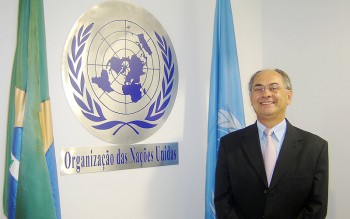AIDS – Don’t Give Up the Fight
On December 1 we observe World AIDS Day. This is a battle that has to be fought on a daily basis with clarification, prevention and, more importantly, with no type of prejudice, which—as I have been arguing for years—assails more than the disease itself. Despite the progress that has been made over the last few years let us not forget that new generations are coming onto the scene and they do not have the same knowledge of the illness as the previous generations and thus being more vulnerable to contagion by this disease. I think, therefore, that it is quite appropriate to present some extracts from an article by Karine Salles, taken from the Good Will Portal:
“Despite its tendency to stabilize, the HIV/AIDS epidemic affects different regions in the world in different ways. According to the 2011 Global Report, from the Joint United Nations Programme on HIV/AIDS (UNAIDS), 34 million people are suffering from the virus. In Brazil, the number is around 630,000. The organization has recognized that new infections and AIDS-related deaths have fallen to their lowest levels since the peak of the epidemic in the 1990s.

Pedro Chequer, UNAIDS Coordinator in Brazil.
“Dr. Pedro Chequer, UNAIDS Coordinator in Brazil, talked to the Good Will Portal about the progress made by Brazil in curbing the disease. ‘Since the 1990s, the country has adopted a policy of access to anti-retroviral drugs through the Single Health System (SUS), and thanks to this, it has been possible to maintain this policy until today.’ Brazil was one of the pioneers in distributing all the medication necessary for combatting the virus free of charge.
“In the study, the program pointed out that the Brazilian model for preventing HIV and helping sufferers of the virus is one of the best in the world, above all in treating the most vulnerable segments of the population. However, the data record that the North and Northeast regions are experiencing an increase in mortality and in the number of new cases. And surprisingly, the epidemic has grown in the South, as has also the occurrence of death. (...)
“Treatment is relatively costly and according to Dr. Chequer, ‘it varies from country to country.’ Currently, R$ 800 million is being spent helping 200,000 patients, which is an average of R$ 4,000 per individual. ‘This cost in the 1990s was over R$ 20,000,’ the doctor said. He went on to emphasize: ‘With research, the most important thing now is, first of all, to establish an agenda for social mobilization encompassing the media, the community and local leaders so they can become involved in this process. Second, we need to analyze the question of expanding testing for earlier diagnosis’.”
Dr. Pedro Chequer also sent an email to the Good Will Portal team, showing his admiration for the Temple of Peace, as the most visited monument in Brasília is known: “I frequently visit the Temple of Good Will and every time I receive foreign visitors I insist on taking them there to get to know the place. This adds to my mission of looking for information and spreading knowledge about AIDS.”
Also in an interview with the Good Will Portal, we have the testimony of teacher Nair Brito, who has been HIV positive for 19 years: “Thirty years after the start of the epidemic there are still a lot of people who stigmatize us and that’s bad. It’s a challenge we have to overcome every day. You wake up thanking Jesus for being alive and asking Him to help you continue living with dignity.” In concluding Nair warned: “People who are not infected with HIV should protect themselves. Really protect yourselves, because it’s not good living with HIV, even when you have medication.”
The comments do not represent the views of this site and are the sole responsibility of their authors. It denied the inclusion of inappropriate materials that violate the moral, good customs, and/or the rights of others. Learn more at Frequently asked questions.